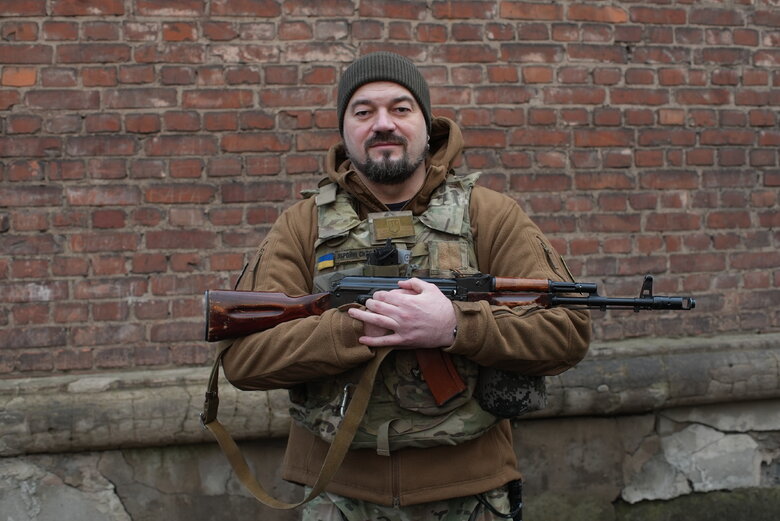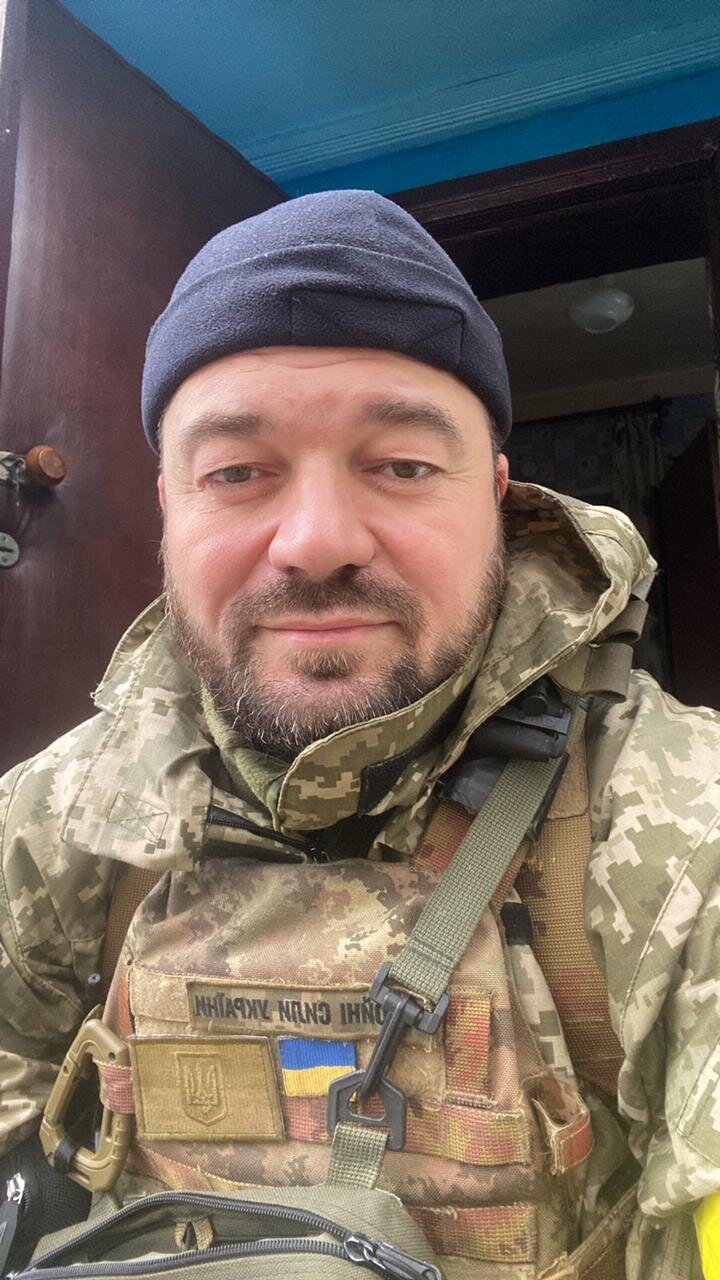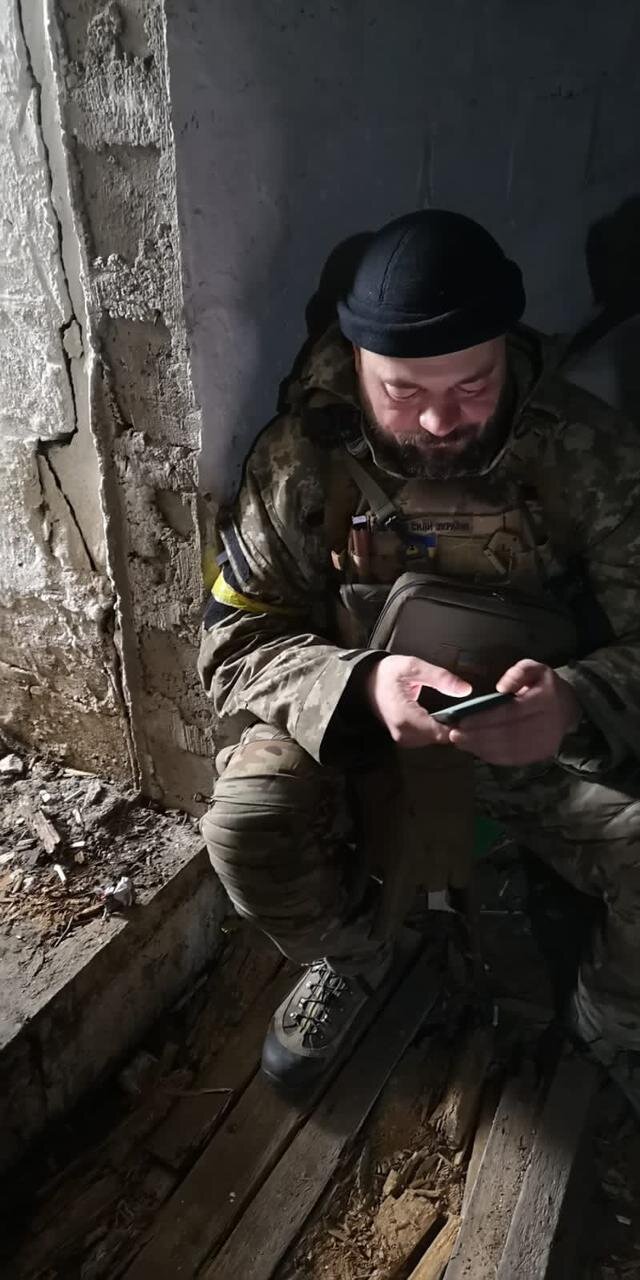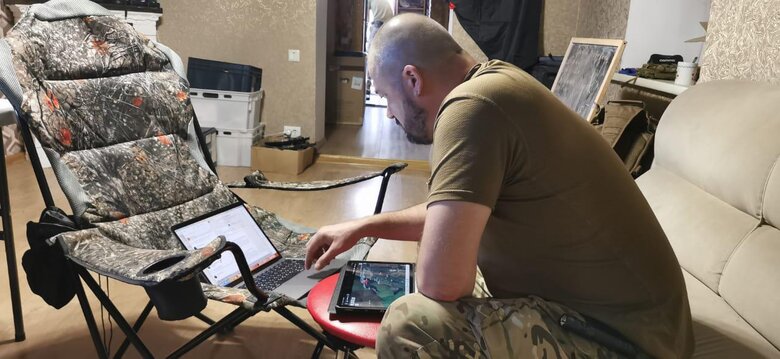Chief of Staff, call sign Genie: "If we demobilize people who know how to fight now, those who replace will do nothing"
Rustam, Chief of Staff of the Unmanned Strike Aviation Systems Battalion "Achilles" of the 92nd SAB, worked as a Chief Technical Officer at an IT company before the full-scale invasion. But on the first day of the Russian full-scale invasion, he joined the 128th Battalion of the TDF (Territorial Defense Forces) and began to fight. His first position was a scout and machine gunner. He jokes that he has made a rapid military career His call sign is Genie.
- "At first, they just called me by my first name," he says, "but later the commander noticed that I looked like a Genie from the Aladdin cartoon - I have a similar earring and smile like this character. That's how the call sign remained.
- Did you hold a weapon before the full-scale war?
- Yes. In 1992, I entered a military school. However, I studied there for two years and dropped it out. But thanks to that, I had the skills for compulsory military service. Then I held a weapon as a sporting tool - I shot a little for my own pleasure. Although, of course, I did not have the experience necessary for modern warfare at the beginning of the full-scale invasion.
- Were you shocked by the events that began on that day, 24 February 2022?
- I was totally shocked! Now many people say they were expecting an attack. For some reason, I was sure that nothing like this would happen, that it was some kind of political games and pressure. Like, somehow it would be resolved. When it all started, I didn't believe it at first. Then I realized that it was war, after all. For several hours I thought that everything would stop quickly because in the twenty-first century in Europe, such events couldn`t last long when tanks destroyed cities. But the situation was escalating. In the afternoon, I realized that it would not go away. You know, my daughter goes to school. I thought that when the war ended, she would come to the place where she would be asked: "What did your father do?" If I don't go to war, she will be ashamed. This thought had a strong impact on me. I got ready to go. My wife was upset, but she understood my decision. So I went.
- Where were the first months? In the Kyiv region?
- Yes, we defended the capital. I don't recall any bright events from that period. The most interesting thing for me began when we were deployed to the Kharkiv region after the defense of Kyiv ended. There, we were already actively working in the area of responsibility of the 92nd SAB. Since then, we have been in the ranks of the best brigade of the Armed Forces of Ukraine.
- Let's return to the charge of Kharkiv region now. I would like to ask you how you initially reacted to statements like the one made by Oleksii Arestovych about "two or three weeks"?
- I didn't even think about it at the time. I looked at myself, at the guys next to me, and realized that no one knew how to fight, and few understood what to do. The commanders also had no significant combat experience. It seemed to most that the first battle would be the last. Therefore, thoughts about whether it would last two weeks, a month, or longer did not matter. At first, everyone accepted that it would not last long for us. Everyone lived for the day. I didn't remember anyone making big plans for the future.
- So, was everyone ready to die?
- I don't know if they were ready, but this thought was in the air.
- It's a gloomy thought....
- At first. And then somehow you get used to it and it systematizes you a little bit and brings you to your senses. When you accept it, you get used to it. This is acceptance. You don't worry about what will happen tomorrow.
- Let's return to the Kharkiv region in the early fall of 2022, when our counteroffensive began. It came as a surprise to civilians, as it was not announced as the next...
- I will tell you that it was not announced for the military either. But an interesting stage before the counteroffensive was the summer when we were standing in our positions and getting used to the war. It all started with that. My comrades and I did a tour of duty to support the Achilles company. There we learned to conduct reconnaissance using UAVs, coordinated interaction with artillery, etc. In a few months, we turned from civilians into a quite effective unit. We already had several aerial reconnaissance groups linked to the artillery in a single "organism". The whole system was operating.
- What was this counter-offensive like for you?
- At first, it was not as desperate for me as it was for the guys, because I had a slightly different task. The majority of the unit worked with the 92nd Brigade, and I worked with a part of the artillery - with the 14th Brigade, which was in a different direction. We were delegated there to interact and help them because they had just entered and did not have the necessary experience and information to work in this particular place. We provided a diversionary attack. We were deployed in the direction of Vovchansk. And then there were heavy battles for Kupiansk. It was a pretty serious war... I remember how there was already a bridgehead there, our guys were flying from the meat processing plant, and three f@ggot tanks came racing out. The distance to them was 50 meters. None of our infantry retreated. Machine gunners cut off the enemy. There were grenade shots at the tanks from all sides. Two burned down at once, one started to run away, and our soldiers chased after him screaming: "Where are you going?". We fought with such roll then, we performed miracles!
The crossing of the Oskil River was terrifying. Just imagine: the low opposite bank, behind the pontoon in both directions, about 500 meters in breadth - a complete mess. Everything was smashed by tanks, mud, it was raining, it was impossible to drive - any equipment got stuck. It was pulled out, and everything around it exploded. It's terrible! In one of the stuck cars, two soldiers were sleeping, because they were so exhausted that they had no strength left. Such total surrealism. But now I remember it even with some romance.
- Can you compare when it was easier - then or now?
- It's just different. Every moment seems to be something special and even the hardest for me. Everything is constantly changing - reconnaissance in the TDF, rifle company, flights, leadership positions. I am always doing something new.
-Where was the hardest part for you?
- Right now. It's always like this! You see each stage like that. And then you remember the previous one: I wish I could return there!
- A grisly discovery after the de-occupation in the Kharkiv region was a mass grave for civilians and soldiers. Have you seen it?
- No, we didn't. We didn't even have that opportunity. We were moving forward then. We had no time. It's always: move forward! We keep moving, we don`t stop. This is the typical characteristic of unmanned units on the front line. They have no time to rest. No matter what happens to the brigade, this unit always has its work to do. Even when it is possible to have a partial rotation or rest, the artillery and pilots work all the time.
- After all, unmanned units are now not only the "eyes of war"...
- They are "lightning".
- You said that aerial reconnaissance has changed the basis of military tactics. How was it changed exactly?
- Actually, I don't like to talk about these topics. When the military starts telling us about the specifics of the use of the equipment, expressing analytical opinions in general, it is wrong. After all, it is not only we who learn but also our adversaries. It is better not to give them important first-hand information. It should be in limited access.
- You don't want to give the cue to the enemy, do you?
- I don't want. And I also have a very negative attitude when someone says things like: "What a stupid thing they are doing! We're going to kick their asses!". From time to time I see such posts on social media and think: "Do you guys think they can't read or what?!"
- Earlier, even in the telethon, similar statements were often made, saying that the enemy is stupid, club-handed and cross-eyed. I think this war would have ended long ago if he were like that. I often hear from the military that Russians learn from us and draw conclusions from their mistakes. Of course, there is a lot of so-called "meat" there, but...
- They have enough competent commanders and soldiers. They hold their ground when they are attacked. They conduct quite brazen assault operations. This is a strong and dangerous enemy. Moreover, they are better equipped than we are. So there should be no illusions here.
- It seems to me that most Ukrainians have already taken off their rose-colored glasses. Government officials no longer talk about the same "two or three weeks," the recent liberation of Crimea, or a quick victory. Their statements have a different tone. President Volodymyr Zelenskyy announced that Russia is preparing an offensive for late May or early June. The head of the DIU, Kyrylo Budanov, also cautiously said that we have a difficult period ahead. What do you think about this?
- If they launch such an offensive, we will beat the enemy. If not, it will be a little easier. We have to fulfill our duties. How could we do otherwise?
- You are currently carrying them out in the Bakhmut direction, which is one of the hottest areas. According to your observations, is the war in a critical phase or which one?
- I doubt I can adequately evaluate it. I even think that any civilian who watches the news and can get information from different sources can do it more objectively. I see what is happening within a radius of 10-15 kilometers from one village to another. I understand what is happening in that forest or behind that hill.
- Civilians are reading that the Russians are actively attacking Chasiv Yar. The foreign press even writes that they may capture it. What do you think?
- You know, I wouldn't treat the loss of any territory with excessive excitement. Yes, positions can be more or less convenient. But holding on to a position where it is no longer possible is not exactly the right thing to do. To defeat the enemy, you need to destroy his army. If we measure our effectiveness by the area we hold or recapture, it will not be maximized. It should be determined by the number of enemies destroyed. If this requires a retreat or maneuver somewhere, it should not be frightening. Of course, the situation when we lose land is bad. But there is probably no other way out. This is the nature of war. If we cling to the territory, we will lose both it and the army.
- I agree that we should define effectiveness by the number of Russians killed. We've killed more than 460,000 of them, and they're still advancing. All the military people I talk to say: "The enemy does not count its losses..."
- He counts, believe me! Of course, they have more resources. Sometimes they fight harder - they can afford heavy losses to accomplish the task. By the way, I think this is what will eventually lead them to defeat. Because this tactic cannot be used indefinitely. But for now, as I said, they can afford it. Therefore, they dispose of this resource as they see fit. But I repeat: it is not endless. These mass assaults can last for a week. Then there is a pause.
- But they immediately recruit new ones!
- Yes, and then again and again. That's why our hard work is done on a regular basis. What can you do?
- There is hope that this work will become a little easier because the United States has finally voted to provide $61 billion in aid to Ukraine...
- Finally, we will have some shells!
- They also promised us F-16s again, which will be able to shoot down the same planes that are now massively dropping GABs on the front line...
- The GABs are such an unpleasant thing. Their whistling is very uncomfortable. You can also see them when you are close. You look and think: "Huh, not at me!".
- In comparison, what is the scariest thing?
- For me, drones are the scariest. This fear is a professional deformation because you understand how they can maneuver and hit. You know how the artillery works, how that GAB falls. If you react correctly, nothing will happen. Only accidentally. However, you can die accidentally anywhere - being run down by a car or something else like that. And on the frontline, don't make mistakes, and you'll most likely be fine. However, drones affect in some way on the nervous system.
- Can this American aid, which we have mentioned, make a significant сhange in the situation at the front?
What do you mean by significant change? Are we going to start attacking? I think it is unlikely. But we can't rule out anything. Will it become easier for us? Undoubtedly! Will the enemy be able to attack in such conditions? Who knows? If we have been able to fight back all this time without the necessary resources, then the question is what will happen when we have these shells and missiles. Perhaps we will move forward a little. Why not? I saw a similar situation last year in Bakhmut when it was at its peak. I was then on a tour of duty with a unit of the 92nd Brigade. We were holding the upper road. There were continuous attacks for about two months or even more. Day and night, these "Wagner" were advancing and advancing. The trenches were strewn with corpses. It was scary! At some moment, we thought we would not be able to withstand it. What are we going to do? But it all ended somehow smoothly - there were no Wagners, and some paratroopers came who were feeling bad. When our drones were flying at them, they were shooting in the trenches, blowing themselves up with grenades. I think you saw a video of one of them even surrendering to the drone. That's when we moved forward and drove the enemy out quite far away. Now that territory is unfortunately lost. But my point is that their resources are not infinite either. If they are so "died" in these offensives, then when we have the necessary ammunition, we will be able to advance - why not? We'll stand somewhere, suffer a bit, and then we'll hit them! But it would be very good if guys from civilian life could also come in and help. Somehow, in my opinion, it looks... unfair.
- In order for new guys to replace to help, a law on mobilization was adopted. However, it took a long time to get it approved and rewritten. How did you look at all this?
- Somehow I didn't follow these events. But I did follow the American aid. I was interested in it. The issue of supplies confused me. And the law on mobilization seemed to me to be a "secondhand embarrassment." Even reading about it made me feel uncomfortable. So I didn't even look in that direction.
- But you need to be renewed at the front, to carry out rotations. I'm not talking about demobilization now, although this provision was also in the draft law until it was removed. By the way, what was your attitude to this?
- I have a positive attitude. Let's be frank: if we demobilize people who know how to fight now, those who replace will do nothing.
- What if we implement it step-by-step?
It is hardly possible to recruit two more armies like the one we have. Why create an illusion for people who are already in a borderline state? We need to be honest: "Yes, guys, you will have to endure to the end. This is how it happened. Sorry!" Promise some benefits, provide rotations and give them a chance to rest. This is the right thing to do. Now how can we pass on the military's invaluable experience to the new recruits? The point here is not even to impart knowledge. You can teach a person how to move, tell them and show them what to do and how to do it. This is necessary. But until they have spent some time in positions where it is flying and firing from all sides, when the enemy is maneuvering nearby, until they have stopped being afraid and learned to control their adrenaline, nothing will happen. I remember an untrained TDF at the beginning of the invasion and three months after the fighting. They were completely different people! They already understood what was dangerous, what they had to do, and what actions the enemy might take. This is such a "sharp-tongued" infantry that is not easy to knock out of position. Yes, they are not trained enough to carry out city mopping-up operations, but they can definitely hold their ground. There's a term for them: old sea-dog. That's what I'm talking about: no matter how we train people, they have to go through a certain path in war.
- Indeed, you need experience. Are you different people today and at the beginning of the full-scale invasion?
- I don't think so. In fact, I have the impression that I am the same person today as I was in my first year. When people call me by my given name and patronymic, I feel a little embarrassed. But still, I'm proud of myself when I'm addressed that way.
- You have a corresponding post - Chief of Staff. Your colleagues have told me that they consider proper contact with their subordinates to be the most important thing in their work: not just setting a task and monitoring its implementation, but also constantly communicating, understanding the needs and problems of the soldiers. If necessary, to come to the rescue. Do you have your own, let's say, "professional secrets"?
- You just have to treat people humanely and with respect. Perhaps, life experience also helps. When necessary, I try to cheer the guys up.
- Is it difficult to manage?
- It is difficult when you feel responsible for all this. It puts a little pressure on you. You are always weighing up, making decisions, what consequences they may have, what options you have. It's been especially difficult lately when there are no shells and the infantry has all hope in those wretched drones that are made "from mud and straw". It depends on how you organize everything here, the lives of the guys who have taken up positions, who are counting on you that the enemy tanks will not reach them. This is really depressing. You have no room for error.
- No room for error.
- Exactly! It's very hard. You feel that the guys you manage are also trying their best. But from time to time they still make mistakes that upset you. This is such a painful story for me... It was great at first: everyone was shooting, you are one of many. But now when we are constantly on the razor's edge, it's hard to do without everything you need. At the same time, there is pride. You look at the result and think: "What a great job we did!".
- I have concluded from our conversation that you plan to fight until we win, haven`t you?
- What else is there to do? God willing, until victory! I am not a boy: in a few days, I will be 49 years old. If the war lasts for another ten years, I may not be able to handle it. But for now, of course: I want to celebrate the victory as if it were my own.
- What does this war mean to you?
- The biggest project of my life. It's a shame that some people don't come here. Because there may not be a second chance to participate in such an event that turns the world upside down, changes the future (and you do it too). It is very strange to refuse this. It's too big a story to just stand on the sidelines.
Olha Moskaliuk, Censor.NET
Photos are provided by Genie







